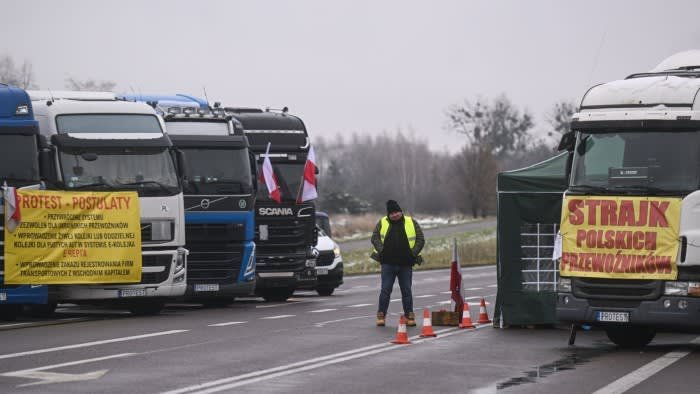Polish truck drivers have extended their blockade along the border with Ukraine in protest at competition from Ukrainian drivers, some of whom have been stuck for 17 days in freezing temperatures, in another blow to Kyiv’s trade and war efforts against Russia.
Backed by local Polish farmers and their tractors, truck drivers on Thursday blocked the main Medyka border crossing, expanding a protest that began at three other crossings on November 6.
Two Ukrainian truck drivers died while waiting to cross, officials and trade unions in Kyiv said, as queues stretched for 25 kilometres (15 miles) on both sides of the border at several crossings.
Local media reported that more than 1,000 Ukrainian trucks were already lined up at the Medyka crossing early Thursday morning. Only cars and trucks carrying military equipment or humanitarian aid were allowed to pass unhindered. Protesters have warned that their blockade could last until January.
Early last year, the Medyka crossing was one of the main gateways for refugees fleeing Ukraine into Poland and other parts of the European Union. The border crossing is also near the southeastern Polish city of Rzeszow, which has become a major hub for the transit of military and humanitarian aid into Ukraine in the wake of Russia’s full-scale invasion.
Ukrainian officials have criticized the escalation of protests. Taras Kachka, deputy minister of economy and trade, said the conflict should be resolved “at the negotiating table… but not on the road during the winter when it harms not only the economy but also the health and lives of drivers stuck there.”
“There is snow and freezing temperatures on the roads, and people are stuck without access to proper sanitary conditions,” Kachka told Ukrainian television on Thursday.
Following the casualties, the Ukrainian embassy in Warsaw issued a new request to the Polish authorities to disperse the protest. “It is extremely important to save lives, stop blocking the movement of motor vehicles and give drivers the opportunity to return home unhindered,” the embassy said in a note.
The Ukrainian Association of Freight Truck Drivers has warned that the blockade could cost the country €400 million in revenue. It added that the situation could get worse as truck drivers in neighboring Slovakia have temporarily closed border crossings with Ukraine.
“The situation is the same in Poland and Slovakia – what they are doing is a violation of the EU treaty (which prohibits) the closure of checkpoints,” said Volodymyr Balin, deputy chairman of the Truckers’ Association of Ukraine.
Long queues formed Wednesday at Hungary’s main border crossing with Ukraine as drivers tried to avoid Poland and Slovakia.
The Ukrainian ambassador to Poland called the protest a “painful stab in the back of Ukraine,” and the government in Warsaw urged drivers to lift their blockade.
But the outgoing government led by the right-wing Law and Justice party, which blocked Donald Tusk’s return to power as prime minister, is avoiding a full-fledged confrontation with truckers, the logistical backbone of Poland’s economy. Tusk is expected to return to office after leading a coalition of parties to victory in October’s parliamentary elections.
Polish truck drivers have written to the European Commission demanding the restoration of transport quotas for Ukrainian trucks that were lifted last year to help Kiev in its war against Russia. The Commission said this was a bilateral issue.
“It is good that the EU has decided to open the borders in a critical war situation, but this should not continue and allow Ukrainian transport companies to establish themselves on our market,” Jan Boczek, president of the Polish Association of International Road Transport Companies, told the Financial Times.
Poland has the largest truck fleet in the European Union, and its drivers’ complaints are also a harbinger of the difficult trade negotiations that await Ukraine before it can join the EU.
Since Russia’s full-scale invasion of Ukraine last year, Ukrainian exports to the EU have increasingly been transported by land. According to Natalia Shpygotska, deputy head of research at Kyiv-based investment bank Dragon Capital, road transport accounts for 43% of the total value of Ukrainian exports to the EU.
The Polish blockade is particularly damaging to Ukraine’s exports of wood, furniture, auto parts and vegetable oils, Szpygotska added. It also puts at risk a quarter of Ukraine’s imported fuel supplies, which are transported by road through Poland.
Some Ukrainian companies have already been pushed into crisis by the Polish blockade, said Timofey Mylovanov, head of the Kyiv School of Economics and an adviser to the Ukrainian government, citing the example of a building materials company that lost 60% of its export business as a result.
The blockade also deepens a trade dispute between Warsaw and Kiev after the ban on Ukrainian grain imports to protect Polish farmers, even though the measure violates the European Union’s common trade policy.
Ukraine’s Black Sea ports in the Odessa region continue to operate despite Russian attacks, making Poland less important for Ukrainian grain exports, analysts say.
Chicago wheat futures rose 1 percent to a near two-week high on Wednesday in response to recent Russian attacks on Odessa rather than the near-closure of the Polish border, according to Andriy Sizov, managing director of Black Sea grain consultancy Sovecon.
Additional reporting by Andy Pounds in Brussels





